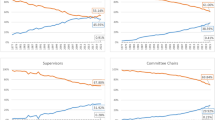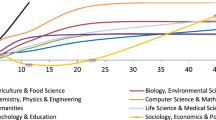Abstract
In this study we analyse gender equality in the preparation, supervision and defence of PhD theses in Spain in the period 1990–2004.
The results indicate a tendency towards greater equality in the number of men and women successfully completing doctoral studies. However, the gender imbalance among thesis supervisors and on thesis assessment boards is more apparent, with a predominance of male academics. Moreover, the gender of the PhD student is clearly related to the gender of the supervisor, and both are related to the gender of the members of the assessment boards of PhD theses in Spain.
Similar content being viewed by others
References
Alcalá, P. (1996), Españolas en el CSIC. Presencia y status de las mujeres en la investigación científica española, 1940–1993. In: G. Becerra, M. T. Ortiz (Eds) Mujeres de Ciencias. Mujeres, Feminismo y Ciencias Naturales, Experimentales y Tecnológicas. Publications Service of the University of Granada, Granada, pp. 61–76.
Alcalá, P., Pérez-Sedeño, E., Santesmases, M. J. (Coords) (2005), Mujer y Ciencia. La Situación de las Mujeres Investigadoras en el Sistema Español de Ciencia y Tecnología, Spanish Foundation for Science and Technology, Madrid.
Andersen, H. (2001), The norm of universalism in sciences. Social origin and gender of researchers in Denmark, Scientometrics, 50: 255–272.
Barres, B. A. (2006), Does gender matter? Nature, 442(13):133–136.
Becerra, G., Ortiz, M. T. (Eds) (1996), Mujeres de Ciencias. Mujeres, Feminismo y Ciencias Naturales, Experimentales y Tecnológicas, Publications Service of the University of Granada.
Black, H. (2002), Toward an equitable Europe. European women take a scientific approach to equality in science careers, The Scientist, 16: 59.
Blickenstaff, J. C. (2005), Women and science careers: leaky pipeline or gender filter? Gender and Education, 17(4): 369–386.
Bordons, M., Morillo, F., Fernández, M. T., Gómez, I. (2003), One step further in the production of bibliometric indicators at the micro level: Differences by gender and professional category of scientists, Scientometrics, 57(2): 159–173.
Bordons, M. (Dir), Mauleón, E., Gómez, I., Morillo, F., Fernández, M. T., Barrios, L. (2006), Incorporación de la Dimensión de Género a los Estudios Bibliométricos, Estudios e Investigaciones, Ministerio de Trabajo y Asuntos Sociales, Madrid.
Bornmann, L., Enders, J. (2004), Social origin and gender of doctoral degree holders: impact of particularistic attributes in access to and in later career attainment after achieving the doctoral degree in Germany, Scientometrics, 61(1): 19–41.
Ehrenberg, R. G., Goldhaber, D. D., Brewer, D. J. (1995), Do teachers’ race, gender and ethnicity matter? Evidence from NELS, Industrial Labor Relations Review, 48(3): 547–561.
Erkut, S., Mokros, J. R. (1984), Professors and models and mentors for college students, American Education Research Journal, 21(2): 399–417.
European Commission, Directorate-General for Research. (2006), She Figures 2006. Women and Science. Statistics and Indicators. Luxembourg: Office for Official Publications of the European Communities.
GARCÍA DE CORTÁZAR, Ma. L., GARCÍA DE LEÓN, Ma. A. (1995), Sociología de las mujeres españolas, Editorial Complutense, Madrid.
GARCÍA DE CORTÁZAR, Ma. L., GARCÍA DE LEÓN, Ma. A. (1997), Mujeres en minoría. Una investigación sociológica sobre las catedráticas de universidad en España, National Center for Sociological Research (CIS), Madrid.
GARCÍA DE LEÓN, Ma A., GARCÍA DE CORTÁZAR, Ma. L. (2001), Las académicas: profesorado universitario y género, National Women’s Institute, Madrid.
Guil, A. (2004), Estudios específicos sobre mujeres y ciencia en Andalucía. Informe para el grupo de expertas Mujer y Ciencia FECYT, Spanish Foundation for Science and Technology, Madrid.
Handelsman, J. & Al. (2005), More women in science, Science, 309(5738): 1190–1191.
Hopkins, N. (2006), Diversification of a University Faculty: Observations on Hiring Women Faculty in the Schools of Science and Engineering at MIT, MIT Faculty Newsletter, vol. XVIII, n. 4, March/April 2006, 15–23.
Kurtz-Costes, B., Andrews Helmke, L., Ülkü-Steiner; B. (2006) Gender and doctoral studies: the perceptions of PhD students in an American university, Gender and Education, 18(2): 137–155.
Lemoine, W. (1992), Productivity patterns of men and women scientists in Venezuela, Scientometrics, 24(2): 281–295.
Leta, J., Lewison, G. (2003), The contribution of women in Brazilian science: A case study in astronomy, immunology and oceanography, Scientometrics, 57(3): 339–353.
Long, J. S., Fox, M. F. (1995), Scientific careers: Universalism and particularism, Annual Review of Sociology, 21: 45–71.
Mauleon, E., Bordons, M. (2005), Productivity, impact and publication habits by gender in the area of Materials Science, Scientometrics, 66(1): 199–218.
Ministry Of Education And Science. (Several Years), University Education Statistic, Madrid: Ministry of Education and Science.
Muñoz, A. (2005), The scholarly transition of female academics at the University of Granada (1975–1990), Scientometrics, 64(3): 325–350.
National Science Foundation (2003), Gender Differences in the Careers of Academic Scientists and Engineers: A Literature Review (Special Report). Arlington, VA, USA: National Science Foundation.
National Statistics Institute. (Several Years), University Education Statistic, Madrid: National Statistics Institute.
Pérez Sedeño, E. (1995), De la biología imaginaria a la sociología real. Obstáculos para el acceso de las mujeres a la ciencia. In: M a. L García De Cortázar, M a. A. García De León (Eds), Sociología de las Mujeres Españolas. Editorial Complutense, Madrid.
Pérez Sedeño, E. (Dir) (2003), La situación de las mujeres en el sistema educativo de ciencia y tecnología en España y su contexto internacional. Programa de análisis y estudios de acciones destinadas a la mejora de la calidad de la enseñanza superior y de actividades del profesorado universitario (REF: S2/EA2003-0031).
Prpic, K. (2003), Professional position, performance and perspectives of (young) women scientist, Drustvena Istrazivanja, 12: 613–634.
Wenneras, C., Wold, A. (1997), Nepotism and sexism in peer-review, Nature, 387(6631): 341–343.
Wenneras, C., Wold, A. (2000), A chair of one’s own, Nature, 408: 647.
Author information
Authors and Affiliations
Corresponding author
Rights and permissions
About this article
Cite this article
Villarroya, A., Barrios, M., Borrego, A. et al. PhD theses in Spain: A gender study covering the years 1990–2004. Scientometrics 77, 469–483 (2008). https://doi.org/10.1007/s11192-007-1965-8
Received:
Published:
Issue Date:
DOI: https://doi.org/10.1007/s11192-007-1965-8




